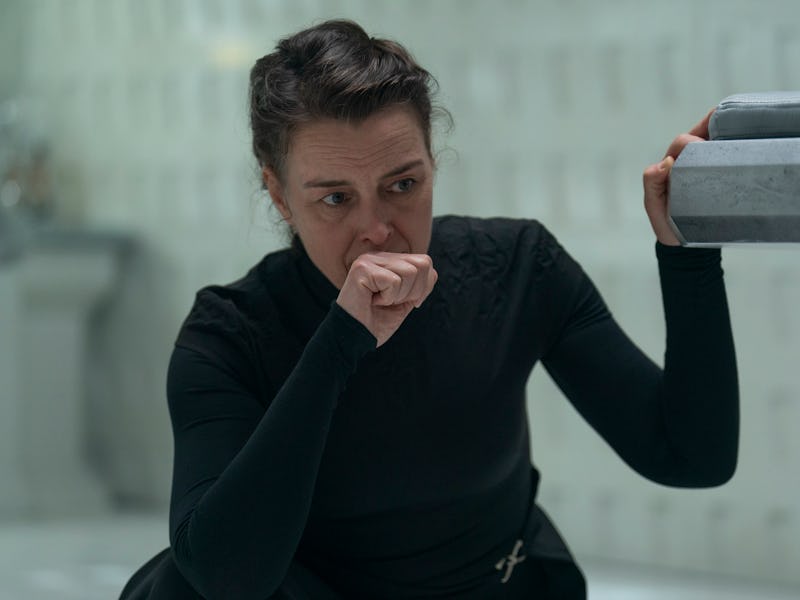Dune: Prophecy Just Rebooted A Weirdly Pivotal Immortal Character
Who is Vorian Atreides?

The earliest member of the House Atreides in the Dune timeline might not be who you think it is. In the original Dune novels written by Frank Herbert, it’s heavily implied that Paul’s line can trace its origins deep into Earth's history, possibly even connecting to Ancient Greece. But relative to Dune’s future history, the first person with the last name Atreides was also the most notorious. And, although this character has yet to make a physical appearance in Dune: Prophecy, he was name-dropped in a big way in the third episode.
In continuity created by the expanded Dune novels, Vorian Atreides is the oldest ancestor of House Atreides and the bane of House Harkonnen. But because Dune: Prophecy takes place after Vorian’s ascendency during the Butlerian Jihad, how is he still alive? In Episode 3, “Sisterhood Above All,” Valya (Jessica Barden) is furious to learn that Vorian has “resurfaced.” Here’s why this could set up big things for the finale of Dune: Prophecy, and how the mention of Vorian could subtly reshape the entire Dune franchise. Spoilers ahead.
While a huge portion of Episode 3 takes place in flashbacks, the events that Valya references are even deeper in the past. While arguing with her family, Valya is furious that “Vorian murdered Griffin, and now he’s disappeared again. It’s not fair!” Griffin was Valya’s brother, who Valya once saved from drowning by using the Voice for the first time. So Vorian’s slaying of her brother is a huge motivating factor for Valya’s machinations, which informs the entire show.
A mysterious Atreides
House Atreides in Dune: Prophecy Episode 3, “Sisterhood Above All.”
Not part of Frank Herbert’s original vision, Vorian became a pivotal figure when he retroactively became the beginning of the Atreides line in the 2002 book The Butlerian Jihad. Prior to that, the unofficial 1984 book, The Dune Encyclopedia, had posited someone named “Demetrios Atreides” as the start of the line. Vorian, in current canon, is the beginning of this family, at least for the purposes of figuring out how the aftermath of the defeat of the Thinking Machines leads to the status quo of the Imperium in Dune: Prophecy.
In the books, Vorian was raised to be sympathetic to the Thinking Machines, but later turned on them and became one of the biggest supporters of the anti-AI movement. But before he switched sides, he had a “life extension treatment” as a young man, which allows him to exist in various eras of the Dune timeline, and appear relatively the same age. He’s not shown up in Dune: Prophecy yet, but that almost certainly will change before the end of the show.
Is Vorian the Key to Dune: Prophecy?
Valya with her brother Griffin. Why did Vorian murder him?
Because Griffin’s murder happens offscreen, by the end of Episode 3, we’ve yet to see Vorian. In fact, when Tula poisons a bunch of members of the Atreides line, Vorian isn’t around. This fact, combined with the detail that Vorian has memories that date back from before the Sisterhood was formed, seems to suggest that unveiling Vorian before the end of the series could help unlock a few mystery boxes at the same time.
In the prequel books, Vorian is neither a hero nor villain, and like many Dune characters is complex and full of duplicity. Right now, to the Harkonnen sisters on the show, he’s the worst person ever. But we also don’t know exactly what happened to cause Vorian to slay Griffin — could it have something to do with Thinking Machines? We know that Tula and Valya favor the technology, but use it in secret, against the wishes of the Imperium, and seemingly against some founding aspect of the Sisterhood itself.
Because Vorian Atreides remembers when the Thinking Machines ruled everything and is active in the timeframe of Dune: Prophecy, it seems almost impossible that he won’t play a major role by the end of the series. So far in Prophecy, we’ve seen the Harkonnens clash with the Atreides in the distant past, and in recent flashback. But maybe the ultimate showdown will happen in the present, when the Harkonnen sisters come face-to-face with their greatest foe, and discover he might not be quite what they expected.